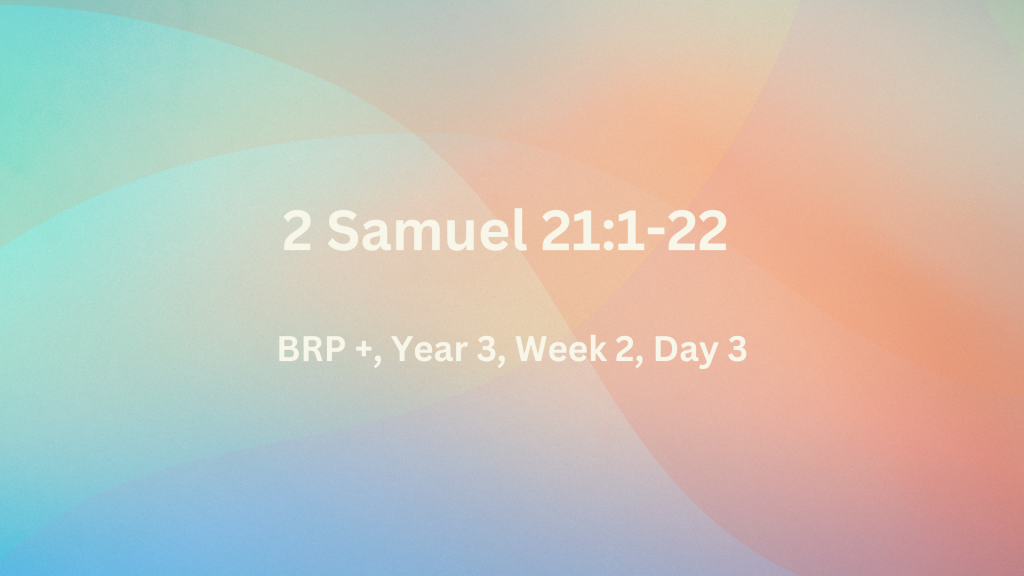2 Samuel 21:1-22
Q.1. What was the cause of the famine? Why did God delay the punishment? How was the broken Covenant placated? – (2 Sam.21:1-6)
God had told Joshua that Israel would inherit the Promised Land, just as He had promised Moses (Josh.1:1-4). However, they had been deceived by the Gibeonites who lived in Canaan – and did not ask for the counsel of the Lord. Joshua had made peace with them and made a covenant with them; and the leaders of the congregation swore an oath to them (2 Sam.21:2 c.f. Josh.9:14-15). Under Saul, Israel had broken that covenant, so – there was a famine in the days of David for three years; and David sought the presence of the Lord. And the Lord said, ‘It is for Saul and his bloody house, because he put the Gibeonites to death’ (2 Sam.21:1). Saul was dead, and David was well established on the throne of Israel by this time. Prior to David’s reign, no one would have identified a drought as being punishment from God for Saul’s efforts to exterminate the Gibeonites. It needed a godly leader like David, to put right Israel’s sin against this people group and – make atonement that you may bless the inheritance of the Lord (2 Sam.21:3 c.f. 2 Sam.21:3-5). David was prepared to do whatever was needed. The Gibeonites asked that seven of Saul’s sons should be hung for the terrible crime (2 Sam.21:6).
Q.2. How did David view a covenant? What concession did Rizpah obtain? Did God approve of David’s actions? – (2 Sam.21:7-14)
David had already demonstrated that he kept his word and would not break a covenant, when he restored Jonathan’s son, Mephibosheth (2 Sam.9:1 & 7). Here again – the king spared Mephibosheth … because of the oath of the Lord … between David and Saul’s son, Jonathan (2 Sa,21:7). David took seven of the sons born by Saul from his wives Rizpah and Merab and gave them to the Gibeonites, to avenge Saul’s disgraceful slaughter of these servants of Israel (2 Sam.21:8-9 c.f. Josh.9:21 & 27). Rizpah was heartbroken and protected the bodies of these sons of Saul – from the beginning of harvest until it rained on them from the sky; and she allowed neither the birds of the sky to rest on them by day nor the beasts of the field by night (2 Sam.21:10). Upon hearing about Rizpah’s extraordinary devotion, David moved to honour Saul’s house and – buried the bones of Saul and Jonathan in the country of Benjamin in Zela, in the grave of Kish his father … (2 Sam.21:14). There had been nothing personal in David’s actions – and after that God was moved by prayer for the land (2 Sam.21:14). N.B. The Mephibosheth’s of verses 7 and 8 had different fathers.
Q.3. Why was this fight against the Philistines David’s last? What advantage did the Philistines have in battles? How did David’s troops prevail? – (2 Sam.21:15-22)
Throughout their history, Israel was repeatedly called upon to defend their territories. Warfare was the lot of God’s people, and still is now, although our warfare is no longer to be against flesh and blood (Eph.6:10-12). David was now growing old and became increasingly weary and vulnerable in battle. In one of these battles, David was almost killed by a massive Philistine. He had to be rescued by Abishai – one of his mighty men (2 Sam.21:18-19). 17 … Then the men of David swore to him, saying, ‘You shall not go out again with us to battle, so that you do not extinguish the lamp of Israel’ (2 Sam.21:17). They knew he would be targeted. They were committed to protect – ‘the lamp of Israel’ because they really loved him. We have a record of the giants belonging to the Philistines, including the four sons of Goliath of Gath. Perhaps this explains why David had selected five stones, not just one (2 Sam.21:22 c.f. 1 Sam.17:40). Goliath, who was slain by David, was from Gath. The Goliath slain by Elhanan the Bethlehemite was a Gittite (2 Sam.21:19 c.f. 1 Sam.17:4). David had set the precedence for his men, that they should not be frightened by their bigger opponents, but instead should trust in the God of Israel (c.f. 1 Sam.17:26, 36-37, 45-47).

